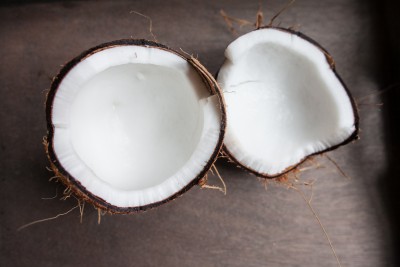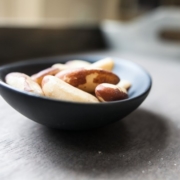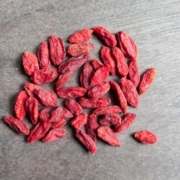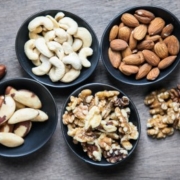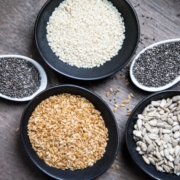The clear liquid from inside young, green coconuts is known as “coconut water,” and makes for a wonderful, delicious, nutritious drink!
Coconut water is a fantastic source of vitamins, minerals, electrolytes (like potassium, magnesium, and sodium), and phytonutrients. These qualities make it an effective (and yummy) method for treating and preventing dehydration – especially for young athletes!
While coconut water is an excellent thirst quencher, there are definitely some things to consider before making it your everyday beverage of choice.
First, understand that while plain coconut water is about 46 calories per cup, and most flavored coconut waters will be much higher in calories – with significantly higher sugar content (more than serving of chocolate ice cream). It’s best to stick to the plain stuff.
It also contains 250mg of sodium per cup, 17% of daily intake, which is worth taking into consideration – especially if you are actively managing the amount of sodium in your diet.
The rehydrating effects of coconut water are similar to those of carbohydrate/electrolyte “sports drinks,” but without the added sugars or artificial colors. Again, these are fantastic properties in a beverage, but if you aren’t replacing the electrolytes lost from exercise or intense activity, it’s probably best to stick with water! If you are going to drink coconut water, limit it to a few servings per day.
Because coconut water is very rich in potassium, it’s important to recognize the potential for electrolyte imbalance – and the dangers that presents. Normally, high potassium content is a good thing because it is essential to the proper function of our blood, heart, and muscles. This usually comes from fruit and vegetables. The recommended daily intake is 5-6 fruits and veggies a day, but most Americans consume far less.
The proper amount of potassium is a delicate balance, and drinking too much can lead to a severe condition called hyperkalemia – a potentially life threatening issue because of the abnormal heart rhythms associated with it. This overabundance of potassium in the blood can cause the lower part of the heart to flutter – and not pump blood as it’s supposed to. This is an extreme, of course, but it’s worth noting any time large amounts of potassium are present.
Another potential danger is related to blood pressure. If you are taking medication to lower your blood pressure, it’s critical to be aware that studies have shown coconut water to increase the effects of such medication – so be sure to consult your doctor if this fits your situation.
Those problems aside, however, coconut water is a delicious and refreshing beverage with an undeniably healthy kick.

